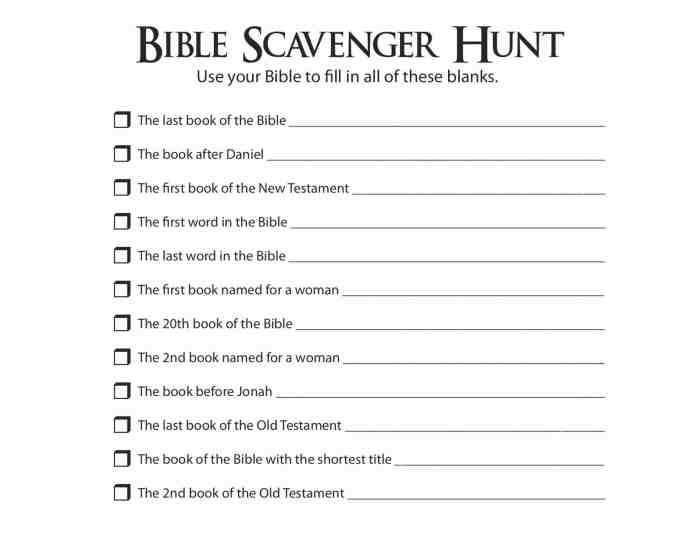Bible scavenger hunt with answers embarks on an enlightening journey, where the quest for knowledge and the thrill of discovery intertwine seamlessly. This multifaceted activity offers a unique blend of entertainment and education, fostering a deeper understanding of the Bible and its timeless teachings.
Through a series of engaging clues and thought-provoking puzzles, participants embark on a captivating expedition, unearthing hidden biblical truths and expanding their knowledge of scripture. Whether undertaken individually, in teams, or virtually, Bible scavenger hunts cater to a diverse range of learning styles and preferences, making them an ideal tool for churches, youth groups, and families seeking to engage with the Bible in a dynamic and interactive manner.
1. Definition and Concept

A Bible scavenger hunt is an engaging activity that combines the study of Scripture with the thrill of a game. It involves hiding clues based on Bible passages and challenging participants to solve them, leading them on a journey through the Word of God.
This activity provides an entertaining and educational way to deepen participants’ knowledge of the Bible, foster teamwork, and encourage spiritual growth.
2. Planning and Preparation
Planning a Bible scavenger hunt requires careful preparation to ensure an enjoyable and successful experience.
Choosing a Bible Version
- Select a Bible version that is appropriate for the participants’ reading level and familiarity with Scripture.
- Consider using a version with study notes or cross-references for additional support.
Selecting Engaging Clues
- Craft clues that are relevant to the Bible passages and challenging yet solvable.
- Use a variety of clue formats, such as riddles, puzzles, or trivia questions.
- Ensure that the clues lead participants through a coherent narrative or theme.
Hiding the Clues
- Hide the clues in locations that are accessible to participants but not too obvious.
- Consider using a map or grid to guide participants’ search.
- Provide clear instructions on how to find the clues and progress through the hunt.
3. Types of Scavenger Hunts
Bible scavenger hunts can be conducted in various formats, each with its own advantages and disadvantages.
Individual Hunts, Bible scavenger hunt with answers
- Involve a single participant working alone to solve the clues.
- Promote self-paced learning and personal reflection.
- May be less interactive and competitive.
Team Hunts
- Divide participants into teams to collaborate on solving the clues.
- Encourage teamwork, communication, and problem-solving skills.
- Can be more competitive and social.
Virtual Hunts
- Conduct the hunt using an online platform or app.
- Provide flexibility and accessibility for participants.
- May lack the physical interaction and hands-on experience of traditional hunts.
4. Clues and Puzzles

Creating engaging and challenging clues is essential for a successful Bible scavenger hunt.
Types of Clues
- Riddles:Pose questions that require participants to think creatively and interpret Scripture.
- Puzzles:Include word searches, crosswords, or anagrams related to Bible passages.
- Trivia Questions:Test participants’ knowledge of specific Bible facts or events.
- Observation Challenges:Ask participants to identify objects or details within a Bible passage or image.
FAQ Corner: Bible Scavenger Hunt With Answers
What is the purpose of a Bible scavenger hunt with answers?
Bible scavenger hunts with answers aim to provide an engaging and interactive way to learn about the Bible, foster teamwork, and encourage spiritual growth.
What are the different types of Bible scavenger hunts?
Bible scavenger hunts can be conducted individually, in teams, or virtually, each offering unique advantages and challenges.
How can I create engaging clues for a Bible scavenger hunt?
Effective clues should be clear, challenging, and directly related to specific Bible passages or themes.
What are appropriate rewards for participants in a Bible scavenger hunt?
Rewards should be meaningful and relevant to the activity, such as books, gift cards, or small Christian items.